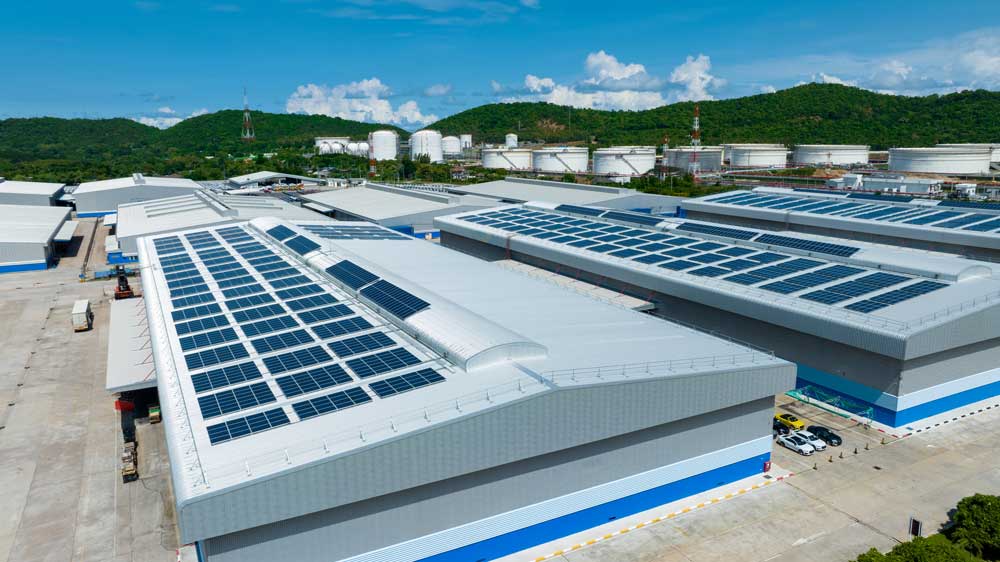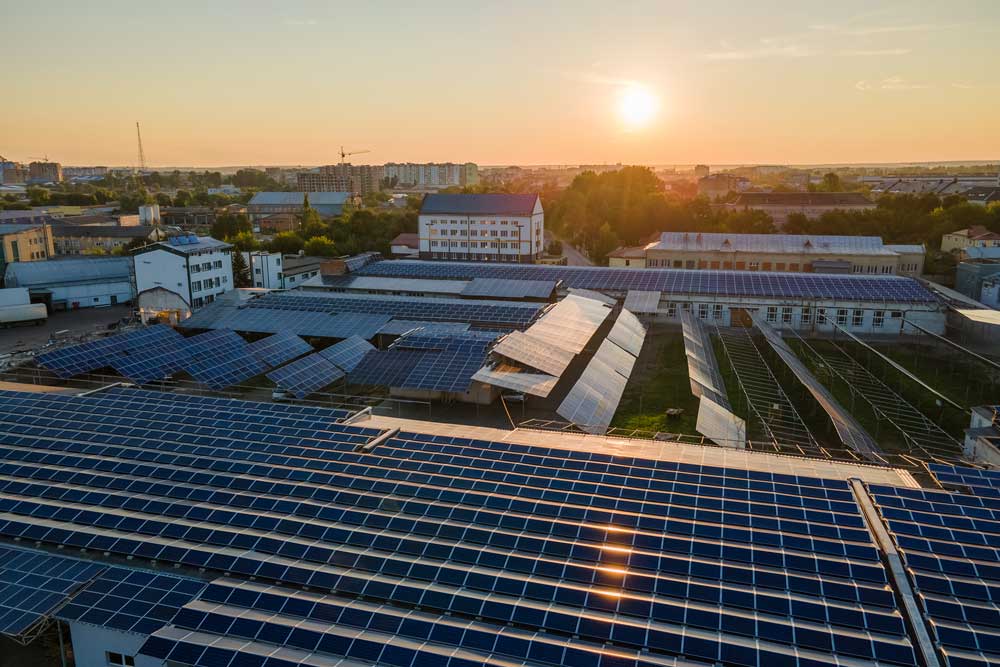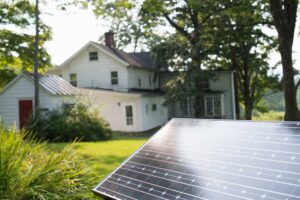Commercial solar panels, also known as photovoltaic (PV) panels, have emerged as a popular and sustainable energy solution for businesses worldwide. These panels harness the power of sunlight and convert it into clean electricity, providing a cost-effective and environmentally friendly alternative to traditional energy sources.
Commercial solar panels are typically made up of numerous solar cells, which consist of layers of semiconducting material that generate an electric current when exposed to sunlight. They are designed to withstand various weather conditions, ensuring durability and longevity. With advancements in technology, commercial solar panels have become increasingly efficient, allowing businesses to maximise their energy production and reduce their carbon footprint. By investing in commercial solar panels, companies can not only save on electricity costs but also demonstrate their commitment to renewable energy and sustainability, contributing to a greener and more sustainable future.
What level of efficiency can be expected from commercial solar panels?
In Australia, the level of efficiency expected from commercial solar panels is generally similar to the global average. Commercial solar panels in Australia typically have efficiency levels ranging from 15% to 20%, with some high-end panels achieving efficiencies above 20%.
It’s worth noting that the actual efficiency of solar panels can vary depending on factors such as the quality of the panels, the technology used, and the specific location and climate conditions in which they are installed.
Additionally, advancements in solar panel technology continue to improve efficiency, and there may be variations among different manufacturers and models available in the Australian market.
ALSO READ: Future of Solar Energy in Australia
How many KWH does a commercial solar panel produce?
The amount of kilowatt-hours (kWh) produced by a commercial solar panel depends on several factors, including the panel’s wattage rating, efficiency, location, orientation, shading, and weather conditions. On average, a commercial solar panel with a capacity of 1 kilowatt (kW) can generate around 4-5 kWh of electricity per day under optimal conditions. However, this value can vary significantly.
To estimate the total kWh production of a commercial solar panel system, you would need to consider the total capacity of all the panels in the system, taking into account their combined wattage and efficiency.
Additionally, seasonal variations, daily sunlight hours, and any shading or obstructions should be taken into account when calculating the expected energy production of a commercial solar panel system. It is advisable to consult with a professional solar installer or use specific solar calculators to obtain a more accurate estimate based on your location and other relevant factors.

What are the benefits of commercial buildings from solar panels?
Commercial buildings can derive numerous benefits from installing solar panels:
- Cost savings
Solar panels allow commercial buildings to generate their own electricity, reducing their reliance on grid power and lowering energy bills. Over time, the savings from reduced electricity expenses can be substantial, contributing to improved financial performance.
- Return on investment
- Environmental sustainability
Commercial solar panels help businesses reduce their carbon footprint by generating clean, renewable energy. By adopting solar power, commercial buildings can contribute to mitigating climate change and demonstrate their commitment to sustainability, which can enhance their brand image and appeal to environmentally conscious customers.
- Energy independence
Solar panels enable commercial buildings to generate their own electricity on-site, reducing dependence on the traditional power grid. This independence provides stability and resilience during power outages or disruptions, ensuring continued operations and minimising potential business downtime.
- Government incentives and grants
Many governments offer incentives, grants, and tax benefits to encourage the adoption of renewable energy. Commercial buildings can take advantage of these programs to offset the upfront costs of solar panel installation and accelerate their return on investment.
- Longevity and low maintenance
Commercial solar panels are designed to be durable and require minimal maintenance. With proper installation and routine inspections, solar panels can have a lifespan of 25 years or more, providing a reliable and low-maintenance energy solution for commercial buildings.
- Marketing and public relations benefits
Embracing solar power can enhance a commercial building’s reputation and attract environmentally conscious customers or tenants who value sustainability initiatives. It can differentiate a business from its competitors and positively influence stakeholders, ultimately improving the overall brand perception and public relations.
By harnessing the power of the sun, commercial buildings can reap these benefits while contributing to a greener future and achieving long-term economic advantages.

Cost of Commercial Electricity vs Residential
The cost of commercial electricity is typically higher than residential electricity rates due to several factors:
- Demand and usage patterns
Commercial buildings often have higher electricity demand and usage compared to residential properties. Businesses typically require power for lighting, heating, cooling, equipment, and machinery, which leads to higher energy consumption. The increased demand results in higher electricity rates for commercial customers.
- Tariff structures
Commercial electricity tariffs are structured differently from residential tariffs. Commercial customers are often charged based on demand, energy usage during peak hours, and other factors specific to their business operations. These tariff structures are designed to account for the higher energy needs and fluctuating usage patterns of commercial customers.
- Infrastructure requirements
Commercial buildings usually have more extensive electrical infrastructure than residential properties. This includes larger electrical panels, higher-capacity transformers, and additional wiring to accommodate the higher electricity demand. The maintenance and upgrades of this infrastructure contribute to the overall cost of commercial electricity.
- Electricity market regulations
Regulatory frameworks can influence the pricing of commercial electricity. In some regions, commercial electricity rates may be subject to different regulations, taxes, or fees compared to residential rates, which can further impact the cost disparity between the two.
It’s important to note that electricity costs can vary significantly based on factors such as location, utility provider, contract terms, and market conditions. Both residential and commercial customers can explore options like energy efficiency measures, renewable energy sources (such as solar panels), and negotiating favorable contracts to help manage and potentially reduce their electricity costs.
The Growth of Commercial Solar Panels
Commercial solar panels have immense potential to transform the energy landscape for businesses. As the world grapples with climate change and the need for sustainable solutions, commercial solar panels offer a compelling option. With the ability to harness the abundant power of the sun, these panels generate clean and renewable electricity, significantly reducing carbon emissions and environmental impact.
By adopting solar power, businesses can demonstrate their commitment to sustainability and environmental stewardship, improving their brand image and reputation. Moreover, commercial solar panels provide a long-term and cost-effective energy solution. While the initial investment may require upfront capital, the long-term savings on electricity bills can be substantial. With advancements in technology and economies of scale, the efficiency and affordability of commercial solar panels continue to improve.
Furthermore, governments and organisations are providing various incentives and grants to encourage businesses to embrace solar energy, further enhancing the financial viability and attractiveness of solar panel installations.
In addition to cost savings and environmental benefits, commercial solar panels also offer energy independence and resilience. Businesses can generate their own electricity on-site, reducing dependence on the traditional power grid and ensuring uninterrupted operations, even during power outages. As the world shifts towards renewable energy, commercial solar panels empower businesses to embrace sustainability, lower their energy costs, and contribute to a greener future.
If you’re still not sure if solar is right for you, we encourage you to reach out to us for a quick quote!








